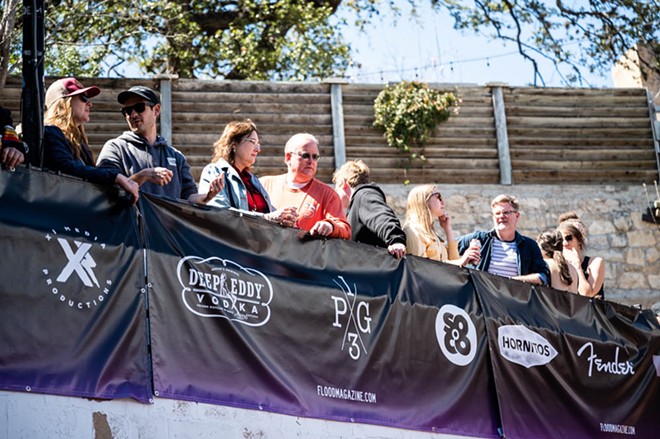
South by Southwest is back, baby! Well, sort of.
After a two-year COVID break, the hyper-frenzied music-film-tech-etc. fest returned March 11-20, albeit to a changed Austin. After topping countless "hip" lists and attracting displaced tech libertarians — hello, Mr. Musk — the festival's host city is deep in an intractable housing crisis, the likes of which have already infected other beloved cultural hubs. Hello, San Francisco, Seattle and Manhattan.
San Antonio would do well to learn from Austin's housing quandary. The same issues — rising prices, displacement, the erasure of the character that make a city distinct — are already on our doorstep. But we'll get back to that.
I've been attending SXSW for 20 years, and every year I sound more and more like the whining old men I used to ridicule. "Son, you should have been there back in my day!" Well, yeah, maybe you should have. Don't get me wrong, there's still much to like about SXSW, but where it now feels like a well-oiled engine of commerce, it once was a mellow, occasionally slapdash gathering with room for surprise. There were more house shows, more impromptu warehouse performances and fewer yuppies. Corporate branding hadn't reached the point of ubiquity.
This year's SXSW may not have featured Lady Gaga barfing glitter inside a three-story Doritos bag — yes, that happened pre-pandemic — but it was still awash in symbols of the festival's shift away from its homespun roots: endless advertisements for cryptocurrency and NFTs, everything stamped with a corporate sponsorship and smiling sales folk shilling new beverages. Weird Water, Music Water or oat milk, anyone?
"We're looking at a plant-based future," one particularly ambitious oat milk peddler told me. "Plant-based food, plant-based music." Huh. Nothing beats seeing a fern shred a guitar solo.
In many ways, SXSW's bigger-is-always-better, let's-see-how-else-we-can-monetize-this-thing approach is emblematic of the housing crisis that looms behind it.
"Everything in Austin is rapidly becoming more expensive, partially due to real estate being held as an investment rather than as a place to live," Ethan Smith, a former housing Advocacy director for the University of Texas's student government, told me.
Smith is an affordable-housing proponent with a ground-level understanding of the issue since he's also a musician and service industry worker. "I don't mean people wanting to buy a second home and rent it out, but large capital coming in. Companies with billions in market valuation. It's a national thing."
Pushed east
SXSW is an extension of Austin. There's no getting around it. And the billions of investment dollars now sloshing around the city can't help but affect the festival as well. Like Austin's resident musicians themselves, the festival seems displaced.
Rising property values have shifted the beating heart of the city's music scene east. Ground zero now seems to be Hotel Vegas and the White Horse in the once working-class area east of Interstate 35.
Now composed largely of shot bars and plastic blues-rock venues, 6th Street is a lost cause, even if the buildings are still beautiful. The nearby Red River Cultural District has lost Beerland and Emo's, two underground rock mainstays. Cheer Up Charlies and the Mohawk remain, but new clubs are moving further south and further east.
"There's less centralization," Smith explained.
During previous SXSW installments, vacant lots along the East Side provided ample room for all sorts of events. Many of those spaces have now been filled in with towering condos, some apparently shoddy beneath their sparkling exterior.
After attending a party for the upcoming Butthole Surfers documentary, I walked past a row of faux luxury condos whose ground floor window ads extolled the virtues of residency there. The images showed a shirtless man, chiseled and oily, running on a treadmill while a couple clinked glasses of bubbly inside a hot tub. However, the building's exterior wall had already begun to crumble, revealing polystyrene under the tasteful pastel paint. Yes, a polystyrene condo. The façade felt indicative of a gold-rush mentality pervading not just in Austin but all Central Texas.
Killing the golden goose
Ultimately, musicians, artists and the working class are hardest hit by the rising housing costs. By virtue of its exploding economy, that's killing the city's proverbial golden goose.
"A lot of our local musicians start as students, and I think we're losing a lot of those students after they graduate," Smith said. "They can't stick around and be broke musicians. Paying the rent in Austin is burdensome for most folks if you're not working a full-time job. That was not the case 10 years ago here, when you had this entire class of people who didn't work full-time jobs or were in the service industry and were able to make ends meet. The city has tried to counter this in certain ways but if housing costs continue rising 20% to 40% year to year, what you wind up with is less musicians."
That doesn't bode well for the city that declared itself the Live Music Capital of the World.
As this year's SXSW wound down, it was clear much remained the same. Barton Springs is still cold, I-35 is still a nightmare and the festival is still overflowing with fantastic bands — even if they're more spread out. Just the same, the city and the festival have both morphed significantly from their charming, low-key origins.
Let's hope both are older and wiser, and trying to avoid becoming victims of their own successes.
Whether they succeed will have a significant impact on San Antonio. More and more folks are drifting southward in search of affordable housing options, potentially worsening the growing crisis in our own city.
Stay on top of San Antonio news and views. Sign up for our Weekly Headlines Newsletter.

















